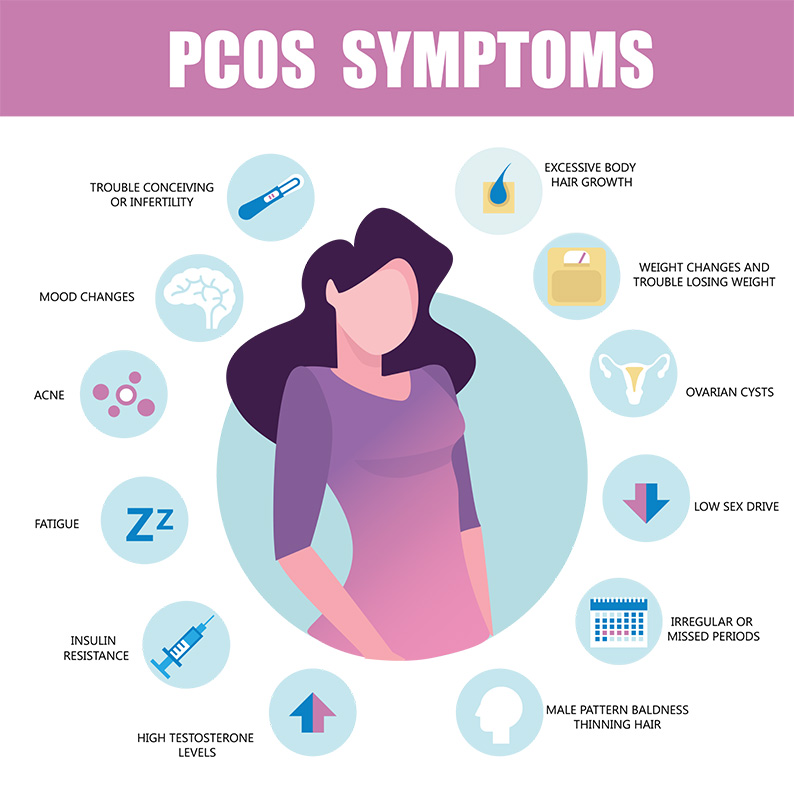PCOS and Pregnancy: Polycystic Ovarian Syndrome, Fertility & You

Roughly 5 million women in the United States of reproductive age are living with Polycystic Ovarian Syndrome (PCOS), according to the CDC. PCOS is a condition where higher androgen levels in the body can lead to irregular periods, ovarian cysts, thinning hair, excess facial hair (hirsutism), and often a harder time getting pregnant.
If you have PCOS and are trying to conceive (TTC), read on to learn more about options and check out our 7 tips to help improve your chances of geting pregnant faster, which apply to all couples.
Can I Get Pregnant with PCOS?
Infertility is a reality for 70-80% of people with PCOS, and PCOS is one of the most common causes of infertility nationwide. However, that does not mean you can’t get pregnant if you have PCOS. It may be more difficult for you to get pregnant, and you may need assistance with fertility treatments to help with ovulation, but PCOS-related infertility is often treatable.
Your TTC journey may be longer than for some women without PCOS, but modern medical advances have helped many get pregnant with PCOS. Remember, “infertility” doesn’t mean you can’t get pregnant at all; rather, it’s defined as not getting pregnant after a year of regular, unprotected sex. According to the CDC, about 1 in 8 U.S. couples experience infertility.

How Does PCOS Affect Fertility?
PCOS causes a variety of symptoms that can make getting pregnant more difficult. You may not have all of the symptoms below, and they aren’t exclusive to a PCOS diagnosis, but they can be more common when you’re living with PCOS. They can also occur together, creating a compounding negative effect on your fertility. PCOS symptoms that can affect your fertility include:
- Ovarian cysts that can affect ovulation
- Irregular periods or no periods
- Hormone imbalances in the body
- Difficulty regulating metabolic processes in the body, including insulin resistance, impaired glucose tolerance, or Type 2 diabetes
- Weight gain
- Higher risk of first-trimester miscarriage
That can look like a long list of ways PCOS can make it harder to get pregnant, but there are some things you can do to help your chances of getting pregnant with PCOS.
Tips for Getting Pregnant with PCOS
Things You Can Do to Help Improve Chances of Getting Pregnant
Maintain a Healthy Diet and Weight
Being obese or overweight can make pregnancy more difficult for anyone, with or without PCOS. Check in with your doctor about a nutritional plan and exercise schedule if you’re trying to get pregnant. Try to avoid high sugar foods and drinks, processed or fried foods, and high-glycemic carbohydrates as much as possible. Substitute a lean protein, lots of vegetables, extra fiber, and plenty of water to help keep your blood sugar stable and feel full.
Quit Smoking
If you’re trying to conceive, you can improve your fertility chances by quitting smoking – and that goes for your partner as well. Research shows that smoking can make it more difficult to conceive, negatively affect hormone production, harm your reproductive system, and damage the DNA in sperm and eggs.
Curb Alcohol and Caffeine
Limit your alcohol intake (and your partner, too!) if you’re trying to conceive. Studies show that consuming more than 5 units of alcohol per week (3 beers or glasses of wine) adversely affects your chances of getting pregnant. Caffeine has been linked in studies to disrupting implantation and early pregnancy loss, so it’s best to cut back or eliminate both alcohol and caffeine if you want to up your odds of a successful and sustained pregnancy.
Monitor Ovulation
PCOS may affect when and how often you ovulate because it can disrupt hormones that trigger an egg to ripen or release. Use an app, an ovulation calendar, or take an ovulation test to help understand when you may be ovulating and if you are ovulating regularly. Share this information with your health care provider so you can decide if additional help may be right for you.
Speak with Your Medical Professional About …
Insulin Levels
As noted above, PCOS is strongly correlated to insulin resistance, glucose intolerance, and Type 2 diabetes. Paying attention to your body’s insulin levels and keeping them stable and within normal limits can help your chances of getting pregnant. Check in with your doctor for advice about a low-sugar diet or medication that will help lower and stabilize your insulin levels.
Fertility Medications
Many women with PCOS need fertility medications that help stimulate the ovaries to release eggs. Pills such as clomiphene citrate, letrozole, or bromocriptine taken at specific times during your menstrual cycle can help you ovulate. There are also injections that may help balance hormones and cause ovulation.
IVF or IUI
An increasingly common option for people trying to conceive (with or without PCOS) is intrauterine insemination (IUI) aka “artificial insemination” or in-vitro fertilization (IVF). As of 2019 (most recent CDC data available), about 2% of babies born in the US were from IVF – almost 84,000 live born infants! IUI is often an early option for people with PCOS to help you get pregnant, which can be followed by IVF if needed. IVF can be a long process, but for many, many people every year, it results in successful pregnancies.
You are Not Alone: Get Support for TTC with PCOS
According to Pew Research Study, 33% of Americans have either used fertility treatments or know someone who has, with an even greater number of people seeking medical advice for infertility. You’re not alone if you’re having trouble getting pregnant with PCOS and there are solutions that have helped millions of people achieve their goal of pregnancy. Visit the First Response Pregnancy Hub to join a community of supportive women.
First Response™ Can Help You Know If You’re Pregnant
When you’re trying to conceive, it can be a good idea to keep at-home pregnancy tests on hand so you can test early and often. FIRST RESPONSE™ has a range of pregnancy tests available to help detect a pregnancy. Try our #1 best-selling Early Result Pregnancy Test detects the pregnancy hormone 6 days sooner than the day of your missed period (5 days before the day of expected period) and is >99% accurate at detecting typical pregnancy hormone levels.
You can also join our FIRST RESPONSE™ Pregnancy Hub Community to connect with other women on their pregnancy journeys, share tips and stories and give and receive support from others.



